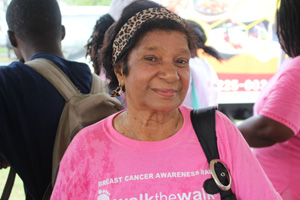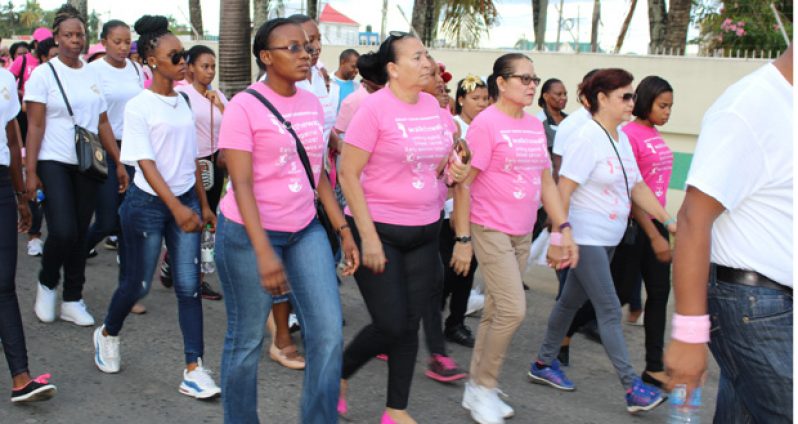By Ravin Singh
THOUGH it was seven years ago, Amina Hassan remembers receiving the devastating news as if it had just been delivered. Aged 67, she sat in the hospital chair in an almost lackadaisical posture, sobbing softly, her eyes glued to a piece of paper which had changed her life. Her trembling hands gripped the paper firmly as if it were to be torn to pieces.
Hassan was diagnosed with breast cancer. She was one of the 1,074 Guyanese women who were added to the list, according to statistics provided by Dr. Jeetendra Mohanlall, acting Chief Medical Officer.

In Guyana, there was a steady increase in cases from 2003, peaking in 2007 with 149 cases; after which there was a steady decrease in 2011, which was followed by a marginal increase in 2012. Between 2003 and 2012, it was discovered that persons of Indian descent, like Hassan, were most affected, and that the second most affected ethnic group was Afro-Guyanese. Globally, 1.38 million new cases of breast cancer are diagnosed annually, according to the World Health Organisation (WHO). With insufficient knowledge on the causes of this cancer, WHO supports the notion that early detection of the disease remains the cornerstone of breast cancer control.
And that’s why Hassan was among those marching on the streets of Georgetown on Saturday to raise awareness about breast cancer. The early detection of “a lump” in her breast a year before her diagnosis was what ultimately saved her life.
“I went to Dr. Bacchus after I discovered the lump, and he tell me to go (to) Woodlands Hospital, but I could not afford it, because I am a widow,” Hassan, now 73, recalls. “I discovered the lump just like that. My hand went right there; I wasn’t even looking for a anything.”
Due to her financial constraints, her next option was to visit the publicly-funded Diamond Diagnostic Centre, where she met two Cuban doctors, who made the discovery after a thorough examination.
Almost in tears, Hassan relates that her biopsy — an examination of tissue to discover the presence, cause, or extent of a disease -– was done in 2008, after which she was told to return six weeks later. Upon her return, she was greeted by one of the Cuban doctors, who gave her the letter and sought to console her after she burst into tears at the damning revelation which she, at that time, had contended would change her life forever.
In June of the same year, she was then requested to return for surgery, which was conducted successfully. “The surgery was successful, thank God; and I am currently on treatment and chemotherapy, which I take very seriously,” Hassan said.
Apart from breast cancer, Hassan experiences low blood count, from which she also suffers, and this had caused her chemotherapy treatment to be reduced from six sessions to four.
Hassan then joined the Georgetown Public Hospital (GPH) clinic, which provides her treatment. “I still do my work; everything — washing, cooking. Every morning when I wake up, I have to sit in the recliner to relax myself. Then I start with my work. But some days when I am not feeling well, I just leave the work. But I make sure I cook my food,” she confided.
Dr Mohanlall, quoted earlier, supports the view that raising awareness about breast cancer is essential in convincing women of the need to get tested.
“Early diagnosis is best,” he emphasises, urging women to know the risk factors for breast cancer. “Once you’re a female, be cautious if you feel a lump,” is an advice he wants women to take.
Those who feel uncertain about self-examination could access public health care facilities across the regions in Guyana.
Being ranked as the leading form of cancer to affect Guyanese, breast cancer currently accounts for almost 17 percent of all cancers and 27 percent of cancers in females, the new statistics reveal.
Chief Oncologist at the Cancer Institute of Guyana, Dr. Sayan Chakraborty, explains that all four stages of breast cancer-related treatment: the diagnosis, chemotherapy, surgery, and radiotherapy, can be done at the institute.
He boasts that Guyana continues to make positive strides in addressing breast cancer and promoting awareness of the disease. “We have been diagnosing newer patients now. We have diagnosed, in the last 20 days, somewhere around five new cases of breast cancer, which are in their early stages, and two of these cases are being treated,” he said.
“Usually, in the previous months, we were having patients who were coming to us at advanced stages”.
Dr Chakraborty’s public awareness has really been working, thanks to several agencies, including non-governmental organisations. However, he sees the need for much more work to be done in this area.
For Chief Oncologist Chakraborty, his favourite quote now should be everybody’s: “Know cancer; no cancer.”




.png)









